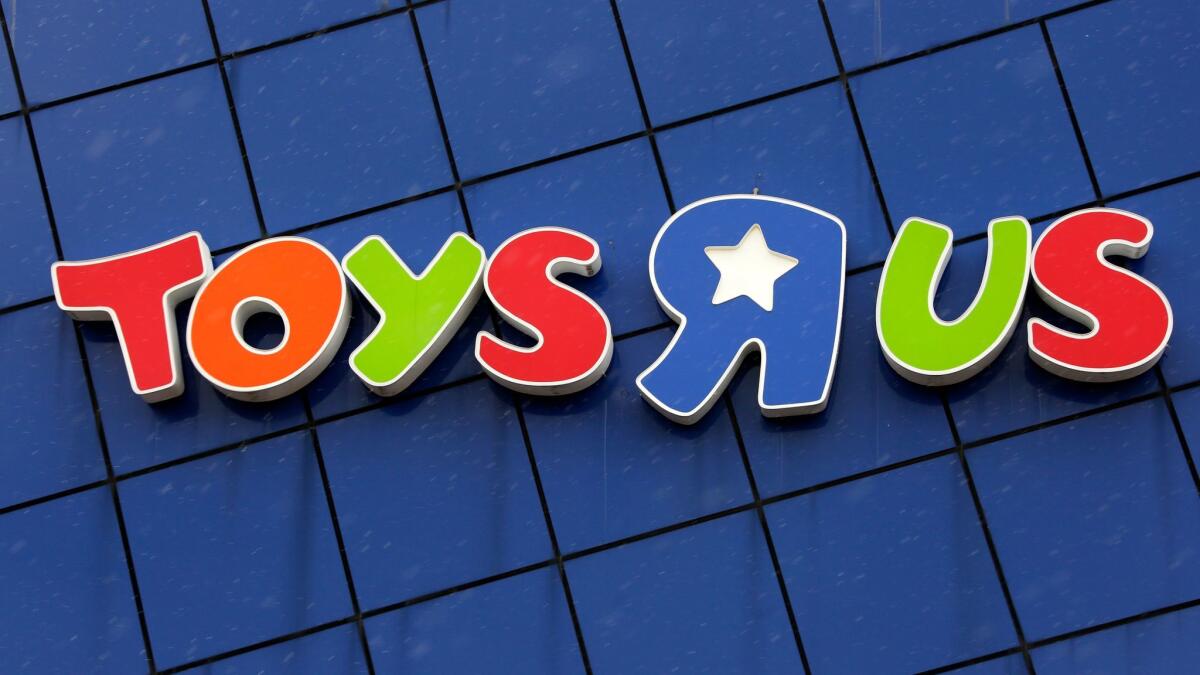Toys R Us liquidation would leave a giant hole in the toy industry

- Share via
Toys R Us Inc. doesn’t sell the most toys in the U.S. — that distinction goes to Walmart Inc. — but it has remained a key proving ground for kids’ gadgets, games and other playthings.
And that may be the biggest blow to the toy industry if the retailer moves ahead with a liquidation of its U.S. operations, a prospect that became more likely this week.
Toys R Us is still the place where up-and-coming products get discovered. The retailer devotes so much of its space to toys — rather than the few aisles at Walmart and Target Corp. — it can take chances on new items and smaller suppliers. In many cases, a product is tested at Toys R Us for a season, then added to one of the mass-market chains.
If Toys R Us disappears in the U.S., innovation will be hurt, according to Gerrick Johnson, an analyst for BMO Capital Markets. Toymakers also will have less of an opportunity to promote their wares all year long, rather than just during the holiday rush.
“Without a dedicated toy retailer — 365 days a year — you will see growth in the industry slow,” Johnson said. “Toys R Us is where new products can be discovered and blossom. It’s also where smaller toy companies can have an opportunity.”
Dwindling options
Bloomberg reported on Thursday that Toys R Us is making preparations for a liquidation of its bankrupt U.S. operations. The Wayne, N.J., company has struggled to find a buyer or reach a debt-restructuring deal with lenders, leaving it with few options.
Toys R Us’ demise would hit a toy industry that’s already faltering. The business grew just 1% in 2017 and fell during the holiday season, according to NPD Group.
Some chalked that up to the struggles at Toys R Us, which entered bankruptcy in September. But others point to an overreliance on movie tie-ins and a lack of novelty: “Star Wars” toys didn’t sell as well as expected, perhaps because kids see them as a tired formula.
L.O.L. Surprise
The items that did do well, such as MGA Entertainment Inc.’s L.O.L. Surprise collectible dolls and accessories, got their start at Toys R Us — another sign of the chain’s hard-to-replace role. Everyone will feel the pain if the company goes away, Jefferies analyst Stephanie Wissink said in a note.
“No toy company will be spared entirely in the seemingly likely liquidation of Toys R Us,” she said.
The short-term impact of clearance sales could be especially painful for the industry. When a company liquidates merchandise with huge discounts, it often sucks up market share and slows competitors’ sales.
Investors have grown increasingly worried. On Friday, Mattel Inc.’s shares sank 7.1%, and Hasbro Inc. fell 2.1%. Fellow toymaker Spin Master Corp. declined 3.9%.
Despite its struggles, Toys R Us results show that there’s still demand for toys — with the company generating more than $7 billion in annual sales in the U.S.
And its stores and website offer more of an opportunity to discover new items, Johnson said. In contrast, he said, on Amazon.com Inc.’s site, customers generally already know what they want and aren’t likely to stumble upon something unexpected.
“At Toys R Us, there is a lot of browsing, impulse purchasing and idea generation,” Johnson said. “It’s going to be harder for new items to break out.”
UPDATES:
2:10 p.m.: This article was updated with stocks’ movement.
This article was originally published at 1 p.m.
More to Read
Inside the business of entertainment
The Wide Shot brings you news, analysis and insights on everything from streaming wars to production — and what it all means for the future.
You may occasionally receive promotional content from the Los Angeles Times.










